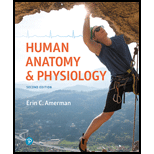
Human Anatomy & Physiology (2nd Edition)
2nd Edition
ISBN: 9780134553511
Author: Erin C. Amerman
Publisher: PEARSON
expand_more
expand_more
format_list_bulleted
Concept explainers
Question
Chapter 11.5, Problem 5QC
Summary Introduction
To review:
The neurotransmitters thathave largely inhibitory effect.
Introduction:
Neurotransmitters are capable of transmitting a signal from one neuron to another. They are chemical messengers produced by presynaptic neurons and released in the synaptic cleft from where they bind to the receptors, present on the postsynaptic neuron membrane.
Expert Solution & Answer
Want to see the full answer?
Check out a sample textbook solution
Students have asked these similar questions
Which neurotransmitters are excitatory and which are inhibitory? How do they exert their effects?
What are the side effects of neurotransmitters?
What are possible fates of neurotransmitters?
Chapter 11 Solutions
Human Anatomy & Physiology (2nd Edition)
Ch. 11.1 - What are the organs of the CNS?Ch. 11.1 - Prob. 2QCCh. 11.1 - Describe the sensory, integrative, and motor...Ch. 11.1 - 4. What are the differences between the somatic...Ch. 11.1 - How does the somatic motor division of the PNS...Ch. 11.2 - What are the functions of the cell body,...Ch. 11.2 - What are the structural differences between...Ch. 11.2 - What are the functional differences between...Ch. 11.2 - What are the functions of astrocytes?Ch. 11.2 - Prob. 5QC
Ch. 11.2 - Prob. 6QCCh. 11.2 - 7. What is the function of the myelin sheath?
Ch. 11.2 - How does the myelin sheath differ in the CNS and...Ch. 11.2 - Are neurons more likely to regenerate in the CNS...Ch. 11.2 - Prob. 10QCCh. 11.3 - 1. What is the resting membrane potential?
Ch. 11.3 - In and around the axon, where is the higher...Ch. 11.3 - Prob. 3QCCh. 11.3 - 4. Define local potential. Why is it also called...Ch. 11.3 - Why are local potentials useful only for...Ch. 11.3 - What takes place during the depolarization phase...Ch. 11.3 - 7. What must be reached in order for...Ch. 11.3 - 8. What takes place during the repolarization and...Ch. 11.3 - 9. What are the absolute and relative refractory...Ch. 11.3 - 10. How do local potentials and action potentials...Ch. 11.3 - Which is useful for long-distance signaling, and...Ch. 11.3 - 12. How is an action potential propagated down an...Ch. 11.3 - Prob. 13QCCh. 11.4 - What are three locations where presynaptic axons...Ch. 11.4 - Define synaptic transmission.Ch. 11.4 - Prob. 3QCCh. 11.4 - How do the two types of postsynaptic potentials...Ch. 11.4 - Prob. 5QCCh. 11.4 - Prob. 6QCCh. 11.5 - Prob. 1QCCh. 11.5 - Prob. 2QCCh. 11.5 - Prob. 3QCCh. 11.5 - Prob. 4QCCh. 11.5 - Prob. 5QCCh. 11.5 - Prob. 6QCCh. 11.6 - 1. Why are neurons organized into neuronal...Ch. 11.6 - Prob. 2QCCh. 11.6 - 3. What mechanisms stabilize neural circuits?
Ch. 11 - Which of the following statements about the...Ch. 11 - 2. Regulation of heart rate, blood pressure, and...Ch. 11 - Match each type of neuroglial cell with its...Ch. 11 - 4. Mark the following statements as true or false....Ch. 11 - 5. An axon is best defined as a process that:
a....Ch. 11 - 6. Fill in the blanks: The myelinated segment of...Ch. 11 - 7. Fill in the blanks: The _______is the period of...Ch. 11 - 8. Which of the following statements best...Ch. 11 - 9. Identify the following as properties of...Ch. 11 - The trigger for exocytosis of synaptic vesicles...Ch. 11 - Match the following neurotransmitters with their...Ch. 11 - 12. Which of the following is not a method by...Ch. 11 - 13. A ________is characterized by multiple input...Ch. 11 - Mark the following statements as true or false. If...Ch. 11 - Sequence the following list of events of a...Ch. 11 - 16. Mark the following statements as true or...Ch. 11 - 1. A drug that blocks channels in neurons does so...Ch. 11 - Prob. 2CYUCh. 11 - Why must a cell body be intact for an axon to...Ch. 11 - 4. Explain how an action potential is propagated...Ch. 11 - Prob. 1AYKACh. 11 - 2. During a surgical procedure, an...Ch. 11 - Albert accidentally ingests the poison...Ch. 11 - 4. Albert, the patient in question 3, takes the...Ch. 11 - Predict the effect that tetrodotoxin would have on...Ch. 11 - Explain what would happen if depolarization of the...
Knowledge Booster
Learn more about
Need a deep-dive on the concept behind this application? Look no further. Learn more about this topic, biology and related others by exploring similar questions and additional content below.Similar questions
arrow_back_ios
arrow_forward_ios
Recommended textbooks for you
 Human Heredity: Principles and Issues (MindTap Co...BiologyISBN:9781305251052Author:Michael CummingsPublisher:Cengage Learning
Human Heredity: Principles and Issues (MindTap Co...BiologyISBN:9781305251052Author:Michael CummingsPublisher:Cengage Learning

Human Heredity: Principles and Issues (MindTap Co...
Biology
ISBN:9781305251052
Author:Michael Cummings
Publisher:Cengage Learning